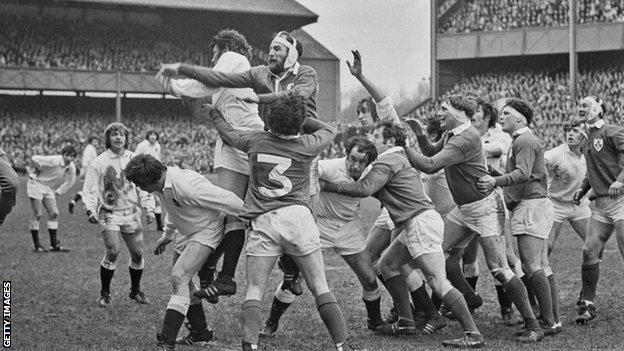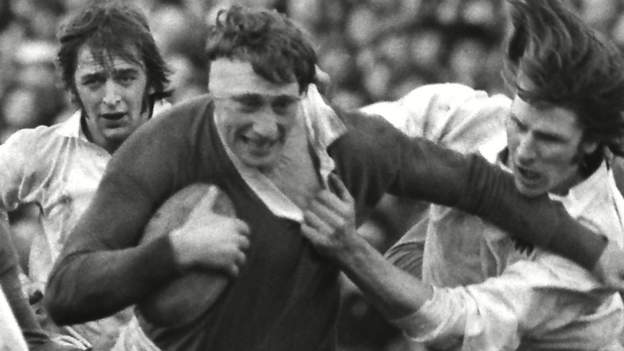

In 1972, the 1972 Five Nations Championship was abandoned. This was for the first time and the only time in its entire history.
Following Bloody Sunday, Wales had decided against playing in Ireland.
Here are former players and officials from rugby who recall their thinking back then.
They were delivered to Lansdowne Road by armed protection and welcomed by a emotionally charged crowd of 50,000 as “an act of great friendship”.

The story began on the 30th January 1972 when 13 people were killed by the British Army’s Parachute Regiment in Londonderry during an attack on a civil rights march. Protestors were protesting against a new law that gives authorities the power to detain people in Northern Ireland without trial.
Bloody Sunday will be forever etched in our collective memory as one of the most horrific events of all time Troubles. Three days after the tragedy, some of those who died in Derry were buried. The British Embassy in Dublin was set on fire and destroyed.
The Five Nations of 1972 opened on 15 January, 15 days before Bloody Sunday. Ireland was also strong in Wales. The anticipation among rugby fans was high. However, the sport soon fell apart like so many other sports.
The campaign began with Ireland’s victory over France in the outskirts Paris on 29 January. They would play England at Twickenham the following day.
Willie John McBride was a former captain of Ireland and an ex-captain of the British and Irish Lions. He recalls being accompanied with an armed guard.
He says, “I can recall being in London with protection and asking the guy beside me, ‘How true is this?’
“He said: “We don’t know and will never know.” You lived with that constant hanging over your head.
“I was getting funny notes about what I, as a northern Protestant was doing for Ireland. But I just continued to go.”
The match ended 16-12 in London with Ireland winning. They won two matches from two and their last fixtures were at home against Scotland, Wales, and Ireland.
After what had happened at the British consulate in Dublin on February 2, there was a sense of anxiety among the Scotland-Wales camps. Officials from both unions met after the teams played on 5 February, with a win of 35-12 for Wales.
The 26 February trip to Scotland was the first. It was agreed, that Wales would do the same as Scotland.

In their conversations with the Irish and Scottish officials, they discussed safety guarantees for Scotland’s players and the possibility that the game could be played elsewhere.
Two offers were made to the Irish Rugby Football Union to hold the two games in neutral territory. One from the Belgian Rugby Football Union and one from the French-Inter Celtic Popular Aid Committee were both offered. They said that they could arrange for Wales/Scotland matches to be played at the Breton cities Rennes or Nantes.
Murrayfield was also suggested as a possible venue. However, the overwhelming response from Ulster delegates (who at the time dominated IRFU) was that it was “Dublin of nowhere”.
The Scots also struggled to find insurance companies that would cover their match in Ireland. This was a major, but not fundamental issue.
They finally decided to withdraw – an outcome that was reportedly voted for by only one vote. It was announced that Scotland would not travel to Dublin on 17 February.
Albert Ferrasse (president of the French Rugby Federation) responded by saying: “Rugby has nothing to lose and everything to gain from it.”
The Irish rugby team had a lot to lose.

The championship was last won by Ireland 23 years ago in 1949. In 1972, they had a strong team. They and the Welsh were the strongest contenders for the title by mid-February.
The Welsh Rugby Football Union (WRU), despite promising their Scottish counterparts the best, was unable to fulfill their national ambitions and delayed making a decision about whether or not they would play in Dublin.
Wales was able to win a second consecutive Grand Slam after beating England 12-3 at Twickenham and Scotland in Cardiff. This feat had been only three times in Five Nations history.
Sir Gareth Edwards, former Wales scrum-half says that while we were keen to play from a sporting perspective there were more serious matters. It was extremely difficult for us to focus on rugby. Many of us thought only about getting married and many people wanted to have children.
“We were friendly with a lot Irish players. We tried getting some information from them, and asked what their thoughts were – we were very worried.
“I knew quite many of the Irish boys, and when we went to tours later on, they’d say: “You should have been there.”
Gerald Davies, a British and Irish Lions supporter, was among the first Welsh players not to play in Ireland. He stated that it would be unfair for his family. After receiving a threatening mail claiming it was from the IRA Prop Barry Llewellyn pulled out as well.
On 11 March, Wales was scheduled to play in Dublin. The WRU held a special two-hour meeting on 23 February. Secretary Bill Clement confirmed their resolve to meet with the IRFU once again.
The Welsh were open to exploring the possibility of a neutral venue. Many IRFU officials thought that agreeing to it would mean accepting that Scotland had right to stop playing at Lansdowne Road.
Wales decided not to fulfill the fixture following a meeting between WRU and IRFU on February 27th. The hope of another Welsh Triple Crown or Grand Slam was dashed. Ireland also missed out on the championship glory.
McBride said that the mood was horrible. McBride says: “The mood was terrible. I don’t recall any games being cancelled due to the Troubles. There had been many compromises made in order to keep the game going.” It was a huge effort to keep rugby union alive.
The two cancelled matches had implications for the IRFU’s finances – with £60,000 in lost ticket revenue (worth about £840,000 today, according to the Bank of England’s inflation calculator).
Irish clubs rallied together to share some financial burden. The union did not refund tickets purchased. France provided further assistance in April when they played in Dublin. The Irish won the friendly 24-14.
However, there was real concern about the Five Nations being affected for many seasons.

Ireland’s first fixture in the following year was a home match against England on 10 February. The weeks leading to the match were filled with doubts about whether the visitors would visit Dublin.
England’s Five Nations training camp was currently being held in Coventry. The players were still uncertain of what would happen. David Duckham, Winger decided to do something. He informed Captain John Pullin that he was going make a telephone call.
Duckham states: “I said that I would ring Willie John.” I will just ring him, and then ask him if he thinks we should go.
McBride answered the phone.
His response: “I told David that David Duckham was the first name on England’s team sheet. You can’t live with it if you just cry about the whole thing.
McBride also said that he didn’t think the England players were the only ones at risk.
“I said that I was going to be on field and they can get any of the other players, but they can’t get me, because I’m a Northern Protestant playing for Ireland.”
The conversation was continued by Dickie Kingswell, RFU President, visiting Pullin’s farm on the Gloucestershire coast. He informed Pullin that they would send an England team to Dublin with their top players.
Peter Jackson, a Derry native and veteran sports journalist, says: “The difference was that the RFU right from the beginning said: ‘We will Send the Team. We will find fifteen Englishmen.
It was important to have security.
Duckham said: “When we came to the ground after landing in Dublin, the aircraft didn’t stop at the departure buildings. We bypassed all of the usual rigmarole, which you have to pass through. [were put]”Onto the coach, where we are surrounded on motorbikes by armed paratroopers and motorbikers.”
The Shelbourne Hotel had armed guards at every floor. England’s squad was told not to leave the premises without their guide. The Irish team was staying at the same location.
Duckham recalls, “We tried to not bump into each other but it was going to happen.
“They brought a movie for us to view and the door behind them was unlocked.” “A shadow was cast on my back, so I turned.”
There was Fergus Slattery, a fellow player in the British and Irish Lions team from the 1971 victory tour of New Zealand.
“We were good friends, and I said “Slats. What are you doing? Duckham says, “Go and watch your film.”
“He said to me: “Duckers, this film is so terrible that I have come to yours.” After the film ended, he escaped through the door!
It was a match that saw one of the greatest moments in rugby history.
England was left alone, so the Ireland team was deliberately kept back before kickoff. Following the match, there was a standing ovation by the crowd for over five minutes.
Billy Glynn, a former president of the IRFU, was at Lansdowne Road that morning. Then, I saw that my own tears were welling up.
“It was an occasion for friendship. “This is a great day to play sport,” I replied.
Duckham recalls it well.
He says, “It was an extremely emotional moment because it caught our attention.” “We didn’t expect the entire stadium would erupt. It was a loud, chaotic cacophony. It was unbelievably painful.
“And then everything changed when the referee whistled and we kicked off!”
Ireland won with two tries by Tom Grace (winger) and Dick Milliken (centre), which saw them win 18-9. However, the outcome was somewhat irrelevant.
Glynn recalled: “After the match everyone was talking about what had happened before kickoff. It is still talked about today by people who say that they were there.
At the post-match dinner, Pullin said the famous phrase: “We may be not very good but at least we show up.”
He received five minutes of additional applause for his comment.
McBride says: “They were terrible days here in Northern Ireland. It was just impossible to predict when it would occur next. There were numerous murders, many people disappeared, there was great turmoil everywhere.
They were horrible, terrible years. It was thirty years of my life that were really destroyed, and that’s not something I can say alone.
“It still stirs up a lot in some rugby corners that those games in 1972 weren’t played. People outside of rugby would be able to tell you how disappointed and frustrated they were.
“Everybody was so eager that England came and we were absolutely amazed. It was very, very important to the country.”
